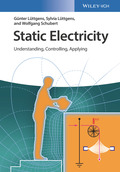Static Electricity
Understanding, Controlling, Applying

1. Edition October 2017
XX, 285 Pages, Hardcover
225 Pictures (152 Colored Figures)
Practical Approach Book
Wiley Online LibraryContentSample ChapterIndexSupplementary Material
Short Description
Written by world-renowned experts on the topic with many years of research and consultancy experience, this invaluable book provides the practitioners' perspective, outlining the dangers and benefits of static electricity in industry.
Buy now
Price: 129,00 €
Price incl. VAT, excl. Shipping
Euro prices for Wiley-VCH and Ernst & Sohn titles are only valid for Germany. In EU countries, local VAT applies. Postage will be charged.
Written by world-renowned experts on the topic with many years of research and consultancy experience, this invaluable book provides the practitioners' perspective, outlining the dangers and benefits of static electricity in industry.
The first chapter reviews the fundamentals of understanding fires and explosions in general and electricity-induced ignition in particular, while the following chapter is dedicated to the origins of static electricity in industrial settings, such as in flowing gases and the transport of disperse systems. The major part of the text deals with measuring static electricity, elimination of unwanted charges and hazard prevention under different conditions. It concludes with an overview of practical applications in chemical and mechanical engineering. Throughout the book, real-life case studies illustrate the fundamental aspects so as to further an understanding of how to control and apply static electricity and thus reduce material damages as well as increase occupational safety.
Plus additional movie sequences on the dedicated website showing static electricity in action.
Understanding Fire and Explosion Processes
Explosion Limits
Ignition Hazards Due to Electrostatic Charges
Comment on the Risk Assessment
Classification of Hazardous Areas in Danger Zones
Protective Measures with Regard to Static Electricity
Methods to Determine the Ignition Capability of Gas Discharges
Avoiding Explosion Hazards
Constructive Explosion Protection
ORIGIN OF STATIC ELECTRICITY
Double Layer Discharge
What Determines the Charging Amount?
Charging of Flowing Liquids
Attempt at Classification
Charging of Flowing Gases
Charging of Disperse Systems
Reduction of Charging Tendency
Electric Field
Electrostatic Induction
MEASUREMENT TECHNOLOGY
Explanation of Electrostatic Measurements
Voltage Measurement with Voltmeters
Measuring the Electric Field Strength
Measuring the Electrical Resistance of Insulating Materials
Other Metrological Applications
Capacity
Influencing Factors
Detection of Gas Discharges
GAS DISCHARGES AS SOURCES OF IGNITION
Gas Discharges in Electrostatics
Gas Discharge Types
Effects of Gas Discharges
How to Avoid Gas Discharges?
Assessment of Ignition Hazards Posed by Gas Discharges
Damage Resulting from Gas Discharges
Effects of Electricity on the Human Body
ELIMINATION OF DISTURBING CHARGES
Discharging of Charged Surfaces
Potential Hazards from Discharging Electrodes
DESCRIPTION OF DEMONSTRATION EXPERIMENTS
Electrostatic Force Effects
Separation Charging
Charging of Particles
Induction
Conductivity
Experiments with the Blast Tube
Gas Discharges
Fire and Explosion Hazards
CASE STUDIES
Investigation Strategy
Ignition Due to Brush Discharges
Ignitions Due to Spark Discharges
Ignition Due to Cone Discharges
Doubts About Electrostatic Ignition
Experience-Led Actions
PRACTICAL APPLICATIONS OF CHARGES
Practical Applications
Examples of Creative Implementations
Summary
MATHEMATICAL TOOLBOX: QUANTITIES, UNITS, FORMULAS,
Appendix A: SI Units
Appendix B: Derived SI Units
Appendix C: Units in General Applications
Appendix D: Decimal Parts and Multiples
Appendix E: Symbols
Appendix F: Permittivity
Sylvia Lüttgens was born in Geroda, 1946, was graduated a teacher and tried to direct the interest of her students to Music and English. Then she learned about static electrification and that it could be the cause for many a fire or an explosion. So she has been working together with her husband Günter, carrying out experimental lectures (up to 2015) in seminars about electrostatics, giving practical proof of the theory. Besides she is publishing articles and writing specialist books on this topic.
Together with Günter she compiled the first encyclopaedia on static electricity fifteen years ago and the third edition was published in 2013.
Wolfgang Schubert was born in 1952. He studied print technology in Leipzig and is a trained printer. He became self-employed in 1997 having previously worked in various managerial roles in the print industry and in sales and marketing for manufacturers of roll fed and sheet fed printing presses. Since then he has also been working in the specialised field of electrostatics, in sales and marketing and also in further education. He has co-authored the specialist publication Static Electricity.
In May 2016 he was publicly appointed and inaugurated by the Leipzig Chamber of Commerce and Industry (IHK) as an expert in the fields of printing processes, printing presses, printability, runnability, and packaging printing. He also works as an expert in the field of electrostatics.


